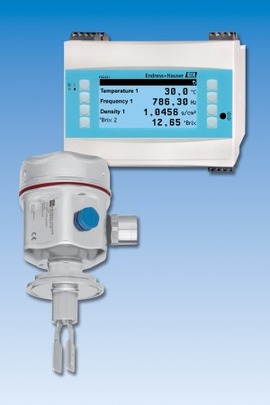
Endress and Hauser has brought out the Liquiphant M, a meter that provides online measurement of density and concentration.
A built-in density calculator can be end-user customised with complex tables and mathematical interdependencies, allowing the meter to provide the same kind of density and concentration measurements once possible only with lab instruments.
Because the Liquiphant M provides online measurements, it allows control systems to react much faster to changing process conditions.
Instead of waiting for results to come back from the lab, a control system can take corrective action immediately by performing closed-loop control.
The Liquiphant employs a mechanically oscillating fork with two tines that are each excited to resonant frequency.
The frequency changes when the fork is immersed in any liquid.
If the vibration falls below a predetermined frequency, the sensor reports the covered state to subsequent switching electronics.
The tines are excited by a piezoelectric drive.
The resonant frequency depends on the moment of inertia of the fork as well as the membrane stiffness; the frequency measures approximately 1000-1200Hz in air.
Changes in resonant frequency are directly interrelated with the density of the medium.
In a lower-medium density, such as liquefied gas, the resulting resonant frequency is higher than in more pronounced densities such as water.
The electronics of the Liquiphant can measure this change in the resonant frequency.
The density of the medium can also be calculated, taking temperature and process pressure into consideration.
Concentration can be calculated in mass or volume units.
For example, 'Degree Brix' is a measuring unit for the specific density of liquids.
This is useful in the food industry for determining sugar content in fruit juices, or in oil production to measure the salt concentration in tanks.
Customers can customise the Liquiphant M for many density and concentration applications, including: content measurement and concentration; quality statements (such as mineral oil or milk); purity indication; product identification; as a changing variable indicating the metabolism in relation to kinetic statements (reaction rate); as a basic variable for physical calculations or simulations; or for clarification of how much material is contained in a given volume.
The Liquiphant M Density meter can provide analytical process information online and inline according to customer requirements.
It offers solutions for a variety of applications, including process optimisation, quality monitoring and waste reduction.
The meter can also be used for monitoring preliminary, interim and final products during blending operations - and for verification and documentation of process steps.
Because it reduces the need for offline laboratory measurements, it also improves plant availability and speeds up responses to changing conditions.

